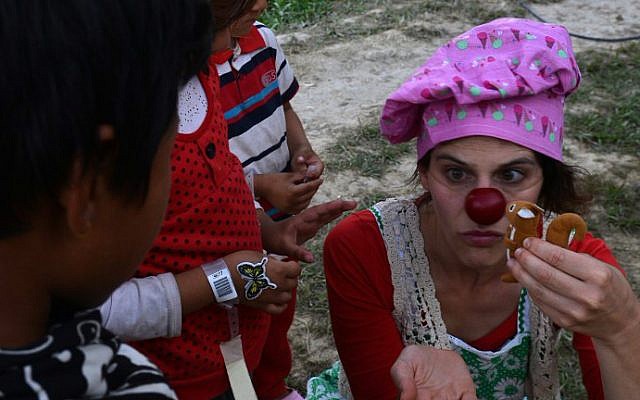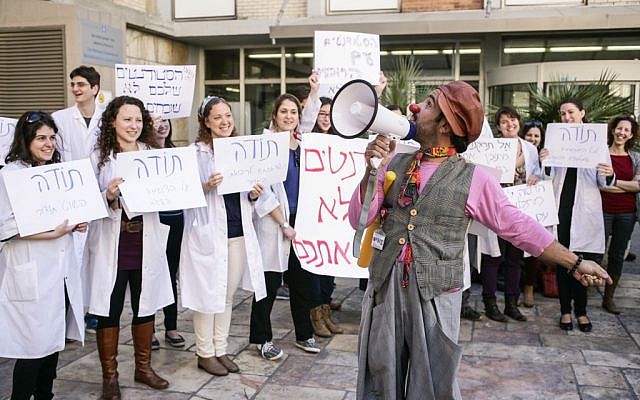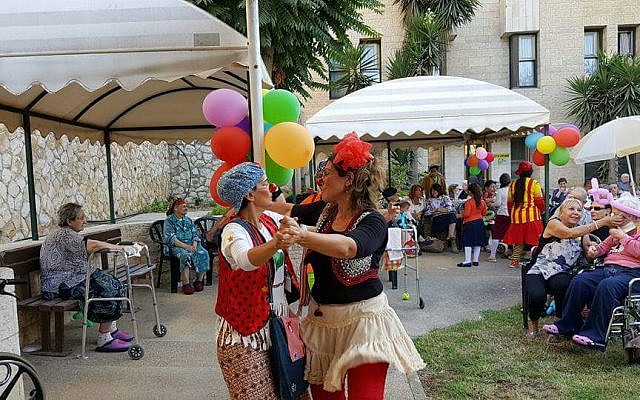The thousands of medical clowns in hospitals across Israel fear a spate of ‘It’-inspired clown spookings by roguish scamps is giving them a bad name

As cinemas across Israel have been screening the movie version of the Steven King novel “It” featuring a psychotic clown who hides in the sewer in order to prey on (and kill) children, cities across the country have been subject to an equally terrifying phenomenon, apparently inspired by the horror-thriller.
In the past week, residents from the northern city of Afula to the Negev town of Dimona have been abuzz with dozens of sightings of clowns lurking the streets after dark.
Noting that wearing face paint and wearing red noses is not crime on its own, police announced Tuesday morning that they had detained eight minors in several separate operations, all on suspicion of “causing panic” while dressed up as clowns.
In the Tel Aviv suburb of Holon, police detained a 14-year-old and a 16-year-old on Monday for wearing clown masks and frightening people in a public park. Officers said a hammer was found in one of the minor’s bags that they suspected was used to scare passersby. In a separate incident, police detained two 14-year-olds from Kiryat Gat for dressing up as clowns and scaring people.
They told investigators they were just “clowning around.”
But for the countless children’s entertainers a kids parties and the thousands of medical clowns working in hospitals across Israel, the apparent pranks are no laughing matter.
Speaking to The Times of Israel, representatives from Simchat Halev (Joy of the Heart), Israel’s largest medical clown union, say that the professionals thumb their shiny red noses at those who are trying turn them into a joke.
“These sick counterfeits are giving us a bad name,” said Sigalit Ben-Lulu, a senior Simchat Halev official and the coordinator of the organization’s Jerusalem members. “They reinforce a stereotype that all clowns are terrifying, but they are also mocking the good work that real clowns do, both in hospitals and as children’s entertainers.”
Since its founding in 2008, Simchat Halev has been providing training and support services for the majority of Israeli medical clowns working in hospitals, rehabilitation centers and nursing homes around Israel, which is seen as a trailblazer in medical clowning.

Ben-Lulu says the organization has trained over 2,000 clowns in that time and currently coordinates activities in 20 Israeli hospitals.
Yael Nakache, a Jerusalem based clown known as “Sopalina” who trained with Simchat Halev and now runs its training workshops — a typical course consists of 20 five-hour-long sessions — says that the pranksters are the opposite of clowns.
“There is absolutely no comparison. These people are wearing masks in order to cover up, to put up barriers. That’s not what real clowns do,” she said. “We wear make up or funny noses so as to break down the barriers. And by doing so, we help to reveal people’s real emotions.”

Nakache said that as Sopolina, she helps patients connect with feelings that are often suppressed by the stress of illness or ongoing medical treatment. “We are not hiding from feelings,we are letting people express their feelings.”

Nakache insisted it was wrong to portray clowns as sinister or evil.
“Clowns care for kids. When kids are scared we make them laugh. We would never want to scare people. Ultimately, scary masks are not clowns,” she said.
But clowns or not, the “scary masks” have been succeeding in spreading dread through Israeli streets. On Tuesday the Education Ministry went as far as to publish guidelines meant to help children cope with the growing phenomenon.
“In recent weeks we’ve been receiving reports from pupils of youths dressing as clowns, going out into the streets and hiding in wait for children and others in order to frighten the public,” the ministry said, urging parents to talk to their kids about it.
It said parents should “hold a conversation that promotes awareness of the issue… while providing information and an address to which to turn for help.”
If teachers decide to talk to pupils about the scary clowns, “It is important to emphasize and take into account the age of the pupils. The conversations must be adapted to their developmental stage, and shouldn’t frighten but rather convey soothing messages and increase their sense of security,” the ministry said.
Ben-Lulu hopes that instead of being adversely effected, her industry can help fight back against those seeking to sow fear.
“This small group of people is reinforcing a stereotype that all clowns are terrifying but real clowns want to help people,” she said.
“We wont let them hurt our profession, or the kids we are here to look after,” Ben-Lulu insisted. “All we need is a bit of love, and maybe a red nose.”
As reported by The Times of Israel
